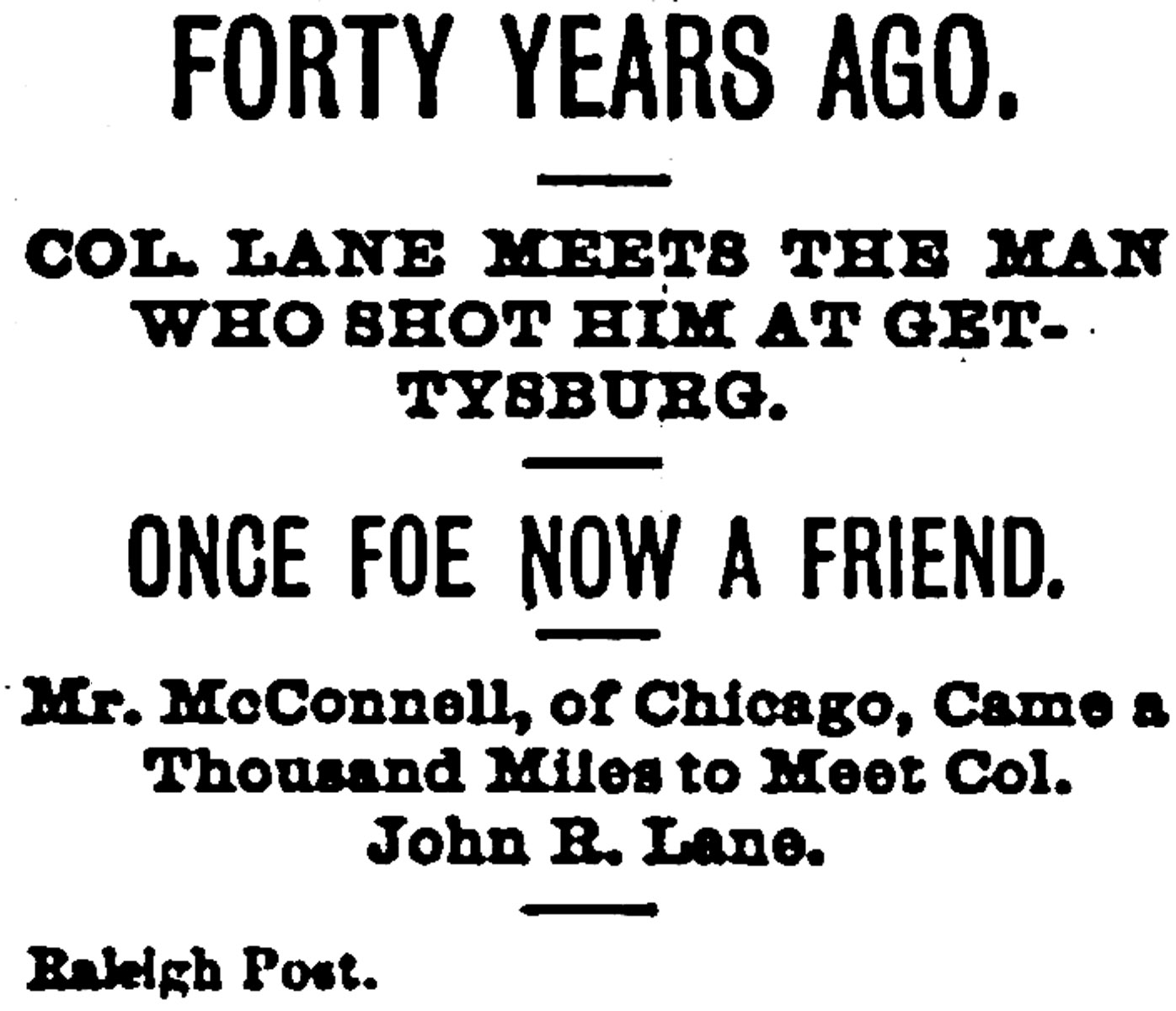The Winston Salem Union Republican
June 4, 1903
Forty Years Ago
Col. Lane Meets the May who Shot Hime at Gettysburg
Once Foe Now a Friend
Mr. McConnell, of Chicago, Came a Thousand Miles to Meet Col. John R. Lane.
Raleigh Post.

A romantic scene was witnessed in the Yarbrough House May 22nd when Col. Cohn R. Lane of Chatham, and Mr. Charles H. McConnell, of Chicago, were introduced, and Col. lane then grasped for the first the hand of the man who shot him down upon the field of Gettysburg forty years ago. Col. H. S. Burgwyn, of Weldon, arranged this meeting between the two scarred veterans and introduced them.
Mr. McConnell served in the 24th Michigan Regiment of the Iron Brigade of the Potomac. His company was almost annihilated at Gettysburg and he has been much interested in gathering historical facts about that great battle. A few years ago he wrote to Col. A. M. Waddell of Wilmington, to secure some information and his letter was referred to Col. W. H. S. Burgwyn, of Weldon. This led to a correspondence between Col. Burgwyn and Mr. McConnell. Later the two met in Richmond, Va., when, in their conversation, Mr. McConnell remarked that he fired the last shot of his company and brought down the color bearer of the 26th N. C. Regiment.
“Then you are the man who shot Cot John R. Lane,” declared Col. Burgwyn. Plans were immediately made for the meeting which took place for Mr. McConnell had a burning desire to know the man he almost mortally wounded.
Mr. McConnell was found by a Post reporter in the Yarborough parlor chatting with Col. Lane. “Yes, I have come all the way from Chicago, and brought my wife, for no other purpose than to grasp the hand of the gallant man I tried to kill and thought then that I had succeeded” said the Chicagoan.
The heaviest losses recorded on any modern battle field, it will be recalled, were the 26th N. C. Regiment, with a loss of 90 percent, and the 24th Michigan with 80 percent loss at Gettysburg. Col. Lane and Mr. McConnell are survivors of these gallant regiments.
In reply to a reporter's question Mr. McConnell gave this account of the shooting of Col. Lane:
“The battle was nearing its close at Gettysburg,” he said, “and only 8 men of the 54 in our company of the 24th Regiment were left. Our ammunition was exhausted but I had one cartridge left which was to be the last shot we fired in that engagement. As I loaded my rifle my lieutenant commander said, ‘Charles! See that splendid color bearer, cannot you knock him over?’ and he pointed at the Confederate colonel not as far as across this street from me. ‘I have my last cartridge and I am going to try,’ I replied, as I rested my rifle against a small tree and took careful aim at the man, who waving his colors and shouting to his men. I fired, saw him fall and then hastened to join , my comrades retreating through Gettysburg to Culp's Hill”
”He is the man who shot me,“ interposed Col. Lane, laying his hand affectionately on Mr. McConnell's shoulder, “It was just as the battle ended and I had turned to cheer on my handful of men and was waving our colors that the ball struck me.” Col. Lane raised his black locks with his left hand and showed the ugly scar on his neck, just below the base of the brain, where the well-nigh fatal ball had pierced.
Col. Lane is the only surviving colonel of the illustrious 26th Regiment. Col. Harry K. Burgwyn, brother of Col. W. H. S. Birgwyn was killed in the same battle that came so near costing Col. Lane his life.
Col. W. H. S Burgwyn took Col. Lane and Mr. McConnell on a drive over Raleigh. They went out to Crabtree where the 26th N.C. regiment was organized and Col, Lane saw his first service as private in Company E. The camp was then under Col. Burgwyn as commandant. They then went to the cemetery to view the monument of Col. Harry Burgwyn, visited the Soldiers' Home and spent an hour with the old veterans, then to the State library to see the painting of the three colonels of the 26th N. C. Regiment, Vance, Burgwyn and Lane.
Mr. McConnell is president of the Veterans' Association or the Iron Brigade of the Army of the Potomac at Chicago and is a highly successful wholesale druggist. He is six feet tall, well proportioned, with his hair and mustache almost White, stands perfectly erect and appears as agile as a youth.
The Union Republican, Winston-Salem, North Carolina, Thursday, Jun 4, 1903, Page 4.